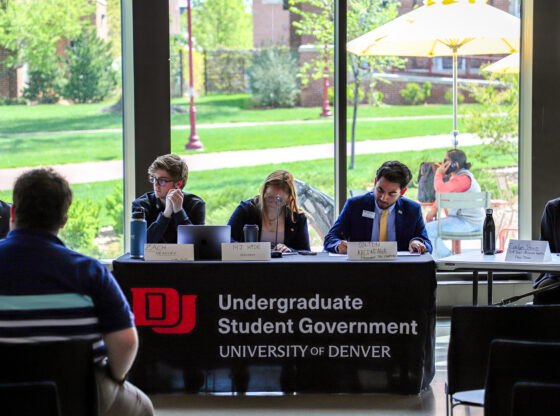 The Department of Campus Safety (DCS) and the Health and Counseling Center (HCC) are reporting a “dramatic” rise in alcohol and fake ID violations on campus, a trend that has raised concerns by both departments.
The Department of Campus Safety (DCS) and the Health and Counseling Center (HCC) are reporting a “dramatic” rise in alcohol and fake ID violations on campus, a trend that has raised concerns by both departments.
Director of the HCC, Alan Kent, said that earlier this academic year the emergency director at Porter Hospital, where a majority of students are sent for treatment in cases of overconsumption of alcohol, called HCC to express concern over the number of DU students being brought to the hospital, as well as the high rates of intoxication of the students brought in.
The Clarion was unable to reach Porter Hospital’s emergency room director for a comment.
According to the Campus Safety Monthly Crime Statistics Report for December, alcohol violations reported in fall quarter increased from 25 in 2011 to 42 in 2012, a 68 percent rise.
Campus Safety Sgt. Stephen Banet said the rise in on-campus reports of underage drinking is “concerning,” and has led to more transports of students to area hospitals and the Denver Cares Detox Center.
“I have heard from conversations with colleagues in other areas of the campus that the levels of intoxication this year are higher,” said Banet.
According to statistics provided by Campus Safety, in the calendar year of 2012 there were 115 transports to Denver Cares, a 21 percent rise from the 95 reported in 2011. There was also a 48 percent increase in alcohol-related transports to local hospitals, from 27 in 2011 to 40 in 2012.
In total, the number of alcohol-related “off-campus transports” has increased from a total of 122 in 2011 to 155 in 2012, a 27 percent increase.
“There has been a very significant increase [of on-campus incidents],” said Kent. “We recognize that college students will drink, but when they are sent to the hospital they are at risk of an alcohol overdose.”
Banet said these statistics may account for only a portion of the rise in alcohol consumption on-campus.
“Another thing to be aware of is that oftentimes there is more than one subject to the report in these cases,” said Banet.
Officials believe the rise may be due in part to an apparent increase in the number of students with false identification, or fake IDs.
“I think that [false ID recovery] really correlates with the alcohol calls,” said Billy Cardenas, Campus Safety Investigator.
While there are no statistics available comparing false identification recoveries in 2012 to previous years, Cardenas says he has noticed the increase. He also said false IDs have become more accessible to students in recent years, especially through the use of websites where students can submit information and have fake IDs sent to them.
Cardenas said students were primarily using the site idchief.com, based out of China, before it was shut down earlier this year. However, he said there are still plenty of options for students who want to purchase fake IDs.
Kent said students do not consider the potential consequences of possessing fake IDs when they are purchased.
“People don’t realize that’s a felony in Colorado,” Kent said. “Having a police record can affect your entire career. There are implications that can affect their whole life.”
However, Banet said Campus Safety tries to keep cases of possession of false identification within DU.
“The reason we try to handle a lot of those internally is because our goal is not to give a student a criminal record when they graduate,” said Banet. “That’s something we take pretty seriously.”
Cardenas and Banet also said they have identified several trends which can be attributed to the rise in alcohol citations on campus. They said officers were encountering more students drinking in the residence halls, as well as a rising number of on-campus parties. They said there has also been a rise in activity from campus Greek Life.
“My opinion is that it’s probably worse than in years gone by,” said Cardenas about Greek Life activity. “It has been escalating.”
This trend is not unique to DU, but part of a nationwide rise in drinking and levels of intoxication among college students.
Kent said many colleges reported similar trends at a national conference he recently attended.
“There definitely seems to be a national rise in high-risk drinking.” he said. “There is something about this era that they are drinking more excessively.”
Banet said these trends raise concern about campus mentality as well.
“What worries me is, what kind of stress are students under that they need to wind down by binge drinking for three days?” said Banet.
Kent said HCC staff are also hearing from students that there is an attitude on campus which encourages drinking.
“One thing we hear is there is a party culture where if you are not drinking, you don’t fit in,” said Kent.
To combat the rise, Banet and Cardenas said there should be more activities offered to students on weekend nights to provide them an alternative to drinking.
Kent said the HCC is working to address the increase in alcohol violations on campus through the creation of a High Risk Prevention Advisory Council which will include HCC staff, campus faculty, Campus Safety members and students.
He said the council is working to research the campus trends through student focus groups in order to find a solution.
“We are trying to understand the problem and provide guidance and prevention to help students drink more responsibly,” Kent said.











